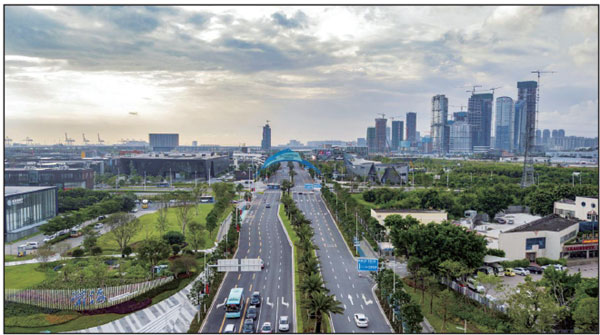Qianhai zone set to grow and expand under Bay Area outline
Qianhai in Shenzhen - one of the national free trade zones in South China - is poised to grow in economy and enhance its role as a Shenzhen-Hong Kong modern service cooperation zone, says Witman Hung Wai-man, principal liaison officer for Hong Kong at the Shenzhen Qianhai Authority.
He believes all this will be possible under the recently released development outline for the Guangdong-Hong Kong-Macao Greater Bay Area.
Hung, a Hong Kong deputy to the National People's Congress, praised the outline for it highlighted Qianhai's advantages in legal affairs and financial services in a practical way.
It also provides grounds for more innovative arrangements involving Hong Kong-Shenzhen cooperation, Hung said.
Currently, about 30 percent of companies in Qianhai are in the financial services industry. According to the outline released on Feb 18, the central government aims to develop Qianhai into a commodities trading platform for domestic and foreign clients. It will also enhance cooperation in green finance and financial technology between Hong Kong and Shenzhen.
Hung believed the policy will further increase the percentage of financial
services companies in Qianhai, and better utilize Hong Kong's role as an
international financial center in the region.
He revealed that the Shenzhen government has approved expanding the land area of the Qianhai free trade zone. Once announced, the free trade zone will occupy an area of about 70 square kilometers, surpassing Nansha and becoming the largest free trade zone in South China.
Talking to China Daily in Beijing during the annual two sessions, Hung said he is working on expanding the application of Hong Kong law to all of Qianhai.
According to current practice, Hong Kong law only applies to business disputes involving Hong Kong enterprises in Qianhai.
"The common law system in Hong Kong is friendlier to business activities," Hung noted. He explained that a common law system had more flexibility than written laws under the civil law system on the Chinese mainland.
"The availability of Hong Kong law in Qianhai will help boost international investors' confidence in their business with the mainland," Hung said. "But people can still choose not to use it - it's just another option."
To facilitate the flow of professionals across the Bay Area, Hung also suggested the launch of a "Bay Area card" for frequent-traveling businessmen, scientific researchers and education professionals - including non-Chinese.
Making reference to the APEC Business Travel Card, Hung said the Bay Area card could be jointly issued by governments of Guangdong, Hong Kong and Macao. Holders can use e-channels for immigration clearance.
They can also carry out more short-term business or academic projects - such as for three months at a time - in the Bay Area cities without the need to apply for working visas, Hung said.
heshusi@chinadailyhk.com

(HK Edition 03/15/2019 page4)
All rights reserved. Presented by China Daily









